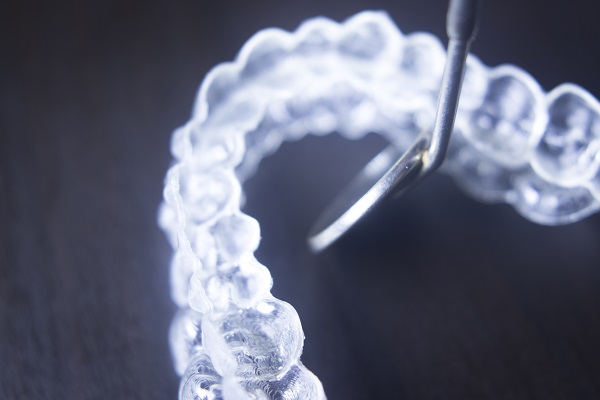What Types of Issues Does Invisalign® Fix?

Clear aligners, such as Invisalign®, have become a popular option for adults who desire to improve the appearance of their smile, but do not want to wear traditional braces. Much of the appeal owes to the more subtle cosmetic appearance of the appliance; however, Invisalign® has also proven to be an effective treatment for many dental issues.
Issues that Invisalign® can treat
Invisalign® uses successively tighter-fitting sets of clear aligners to gradually move teeth into the desired position. These aligners can be used to treat many of the same issues as traditional braces.
Crooked teeth
Many people are motivated to correct crooked teeth by cosmetic concerns. However, crooked teeth can also cause excessive wear, jaw pain, difficulty cleaning teeth and other dental problems.
Overbite
An overbite is when the upper front teeth overlap the lower front teeth. Most people have a little overbite, but excessive overbite can cause problems with chewing and jaw pain.
Underbite
If a person's lower teeth stick out in front of their upper teeth, they have an underbite. Underbites are often caused by the lower jaw being too far forward. An underbite can cause premature or uneven tooth wear, chewing and speech problems.
Open bite
If an individual has an open bite, the upper and lower teeth do not meet. An open bite can make chewing and biting difficult.
Crossbite
When closing the mouth, if some of the upper teeth rest inside the lower teeth, it is called a crossbite. A crossbite can lead to tooth wear or chipping. It can also cause the gums to recede, which can lead to gum pain or bone loss.
Gaps between the teeth
When there is too much room in the mouth, gaps can form between teeth. Gaps can be a cosmetic issue and can also cause food to become lodged between teeth leading to gum disease and tooth decay.
Crowded teeth
When a person does not have enough space in the jaw, teeth can become twisted or overlap. The lack of space between teeth can trap food particles, which can contribute to decay.
Issues that Invisalign® can not treat
Clear aligners do not exert the same amount of force as traditional braces. Issues requiring large amounts of tooth movement, such as these three, may not be able to be treated with clear aligners.
Rotated teeth
Overcrowded teeth can rotate. Teeth that are rotated past 20 degrees can not be treated with clear aligners.
Large gaps between teeth
Invisalign® can be used to close gaps that are 6 millimeters or less in size. Larger gaps need to be addressed with traditional braces or surgery.
Midline movements
Some people's front teeth do not line up with the midline of their faces. Invisalign® can only shift the front teeth 2 millimeters to the left or right.
Conclusion
Invisalign® can not eliminate the need for traditional braces in some patients. However, for many people desiring to improve the appearance of their teeth, they can be a good option.
Are you considering Invisalign® in the Lilburn area? Get more information at https://www.lilburnfamilydentistry.com.
Check out what others are saying about our services on Yelp: Read our Yelp reviews.
Recent Posts
Curious about what a restorative dentist does? Read on to learn more. The unexpected nature of dental injuries can turn ordinary moments into emergencies. These injuries impact oral health and comfort, whether it is from sports mishaps, accidental falls, or an auto accident. A restorative dentist has the skills and tools to repair and restore…
Restorative dentists aim to protect or restore your oral health, function, and appearance. Achieving these goals often involves repairing or replacing missing or damaged teeth. While they offer many restorative services, here are the five most common.A restorative dentist will introduce a dental bridge to ensure the teeth do not shift after a tooth is…
When sudden dental pain occurs, an emergency dentist can provide critical relief and timely treatment. A toothache often appears unexpectedly, disrupting daily activities or restful sleep at night, signaling that you need urgent dental care. Understanding what steps to take when this type of pain occurs can help prevent further complications to your teeth and…
Are you looking for a restorative dentist for your dental needs? Knowing where to start when beginning this search can be difficult, though you can utilize many resources. That said, you will need to consider a few factors when looking for the right dentist. Continue reading to learn more!Here are a few helpful tips for…


